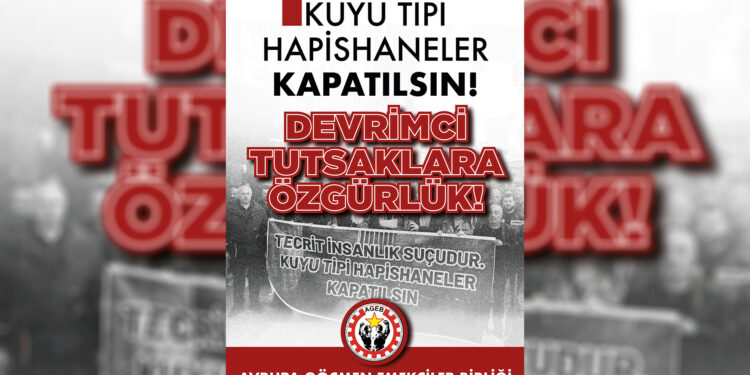
AGEB: Close the Well-type Prisons!
We hereby share an unofficial translation of a statement from Union of Migrant Workers in Europe (AGEB), published on Yeni Demokrasi.
The policy of isolation and torture in prisons continues with arbitrary pressure and practices alongside new types of prisons.
Revolutionaries in well-type prisons are subjected to isolation and solitary confinement torture. Sick prisoners are denied their right to treatment in humane conditions.
Revolutionary prisoners who resist this oppression and cruelty are subjected to torture within isolation, banned from receiving letters and visits, and those whose release dates have passed are kept inside on the grounds that they have not shown “good behavior.”
Tens of thousands of political prisoners are currently in dungeons as a result of fascist state policies.
In recent years in Turkey, the increasingly widespread use of severe isolation practices and the “well-type” Y-type prisons, with their “concrete coffin”-like structure that blocks access to sunlight and air circulation, have been reported by the Turkish Human Rights Foundation (TİHV), the Human Rights Association (İHD), and various other organizations, revealing that these conditions are unsuitable for human life.
The Turkish authorities’ policies of oppression, torture, execution, and murder in prisons against revolutionary and communist prisoners continue systematically.
The executions and torture killings carried out during the March 12 and September 12 fascist juntas remain in our collective memory, as well as the “Return to Life” massacre took place on December 19, 2000, resulting in the killing of dozens of prisoners in order to implement the F-Type system, a uniform cell system involving the isolation of revolutionary prisoners. Before that, fascism had carried out mass killings in Diyarbakır, Buca, and Ulucanlar. It can be said that Turkish prisons are a history of massacres and resistance. Fascism has not hesitated to kill, while revolutionary prisoners have not hesitated to resist.
There are currently 1,412 sick prisoners in Turkish prisons. Over the past 25 years, a total of 2,670 people are known to have lost their lives in prisons, either by being killed or by being denied medical treatment.
The massacres carried out in Diyarbakır Prison No. 5, Metris, Mamak, Sağmalcılar, Buca, Ümraniye, and Ulucanlar, when revolutionary prisoners did not surrender and continued their resistance by any means of struggle, led the Turkish State, having learned from and modeled after its European imperialist masters, to implement Type F prisons in 2000, decided in the National Security Council (MGK). These repressive practices continued during the AKP’s single-Party rule with new types of isolation-based prisons. The varied attacks were implemented in a way that would isolate the entire society. Today, Turkey’s workers and oppressed people live in what is essentially an open-air prison, subject to all kinds of pressure and intimidation policies.
The prison policy, which has been pursued as a State policy aimed at preventing our people from becoming aware, organizing, and fighting against the system by imprisoning the pioneers of the revolutionary struggle and those who have dedicated themselves to the cause of the people’s liberation, continues unabated under the AKP government.
While the government led by Tayyip Erdoğan, continues its process of “negotiation,” “peace,” and creating a so-called democratic society by establishing a commission in the Grand National Assembly, in this context we call on all our people, local and migrant workers, revolutionary and democratic institutions and individuals to raise their voices, to be the voice of the revolutionary prisoners resisting inhuman conditions in the Well-type prisons, to embrace their struggle, and to make their voices heard in the European public sphere and to increase the struggle against fascism!
Union of Migrant Workers in Europe (AGEB)
NOVEMBER 2025

